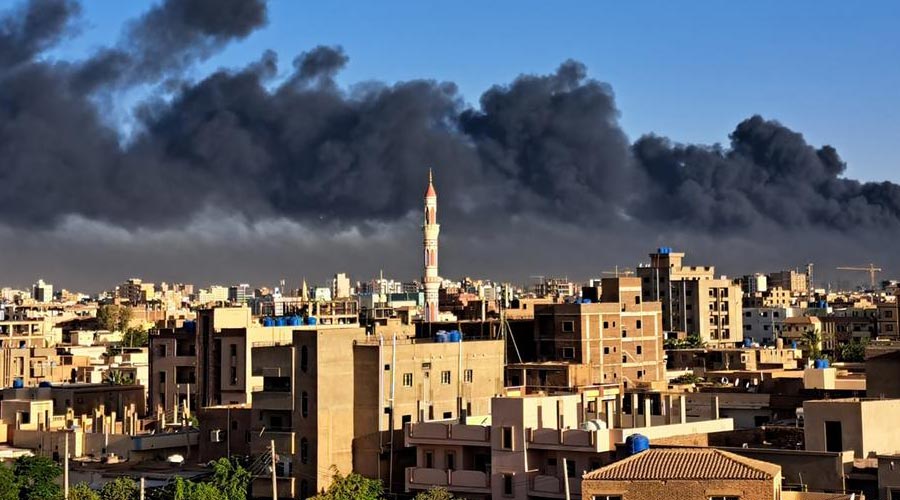Fighting between the Sudanese army and paramilitaries raged in Sudan for a fifth day Wednesday after an internationally brokered 24-hour truce collapsed.
Gunfire, air strikes and bomb explosions have rocked the capital, Khartoum, and some other parts of the Horn of Africa nation.
The violence erupted on Saturday between forces loyal to the head of the Sudanese army — Abdel Fattah al-Burhan, the country's de facto ruler — and his deputy, Mohamed Hamdan Daglo, known as Hemedti, who commands the paramilitary Rapid Support Forces (RSF).
Both men, with a long history of human rights abuses, are battling for control of Africa's third-largest country, which is rich in natural resources.
The bloodshed has so far claimed at least 270 lives and left over 2,600 wounded, said the director-general of the UN's World Health Organization, Tedros Ghebreyesus.
A 24-hour cease-fire was to have been in effect from sundown Tuesday to sundown Wednesday.
But despite the agreement, fighting continued between the two warring parties.
The army blamed the "rebel militia" for the collapse of the truce, accusing it of continuing "skirmishes around the army headquarters and the airport."
The RSF, in turn, accused the army of "committing violations" and breaching the cease-fire by launching "sporadic attacks" on its forces and bases around the capital.
The failure of the truce, despite strong international pressure, raises fears of a prolonged conflict.
How is the violence affecting people?
Most of the fighting is currently reportedly taking place in the capital area, where roughly 12 million of the country's 46 million people live.
The violence has left many civilians trapped indoors and desperately seeking essential supplies.
Many are running out of food and water. It has become dangerous to venture out of the homes to restock on supplies, witnesses told AFP news agency.
"Thousands upon thousands of civilians are trapped in their homes, shielding from the fighting, with no electricity, unable to venture out and worried about running out of food, drinking water and medicine," said UN High Commissioner for Human Rights, Volker Türk.
Many hospitals and other health care facilities have also stopped functioning, either because they were damaged or had to be evacuated for safety reasons.
On Wednesday morning, thousands of people began leaving their homes in Khartoum, some in cars and others on foot, including women and children.
They said the streets were littered with dead bodies, the stench of which filled the air, reported AFP.
What's the conflict about?
The fighting is the latest chapter in Sudan's political turmoil of recent years.
The country witnessed mass protests against three decades of iron-fisted rule under dictator Omar al-Bashir in 2019. The demonstrations were led by an alliance of pro-democracy activists.
Burhan and Daglo, along with other generals, staged a coup to topple Bashir.
The generals and civilian protest leaders then struck a power-sharing deal with the aim of later holding elections and forming a civilian government.
Burhan and Daglo then jointly orchestrated a coup in October 2021, derailing efforts to hand over power to a civilian government.
Under international pressure, both generals recently agreed to a framework agreement with political parties and pro-democracy groups.
But the signing was repeatedly delayed amid tensions over the integration of the RSF into the armed forces and the future chain of command.
The latest bout of violence is also a new blow to the nation's faltering economy.
Nearly a third of Sudan's people, almost 16 million, already rely on humanitarian aid, according to the UN.
What are foreign governments planning to protect their citizens?
Foreign governments, meanwhile, are mulling how to support their citizens currently in Sudan.
The German army said Tuesday it was preparing to support the Foreign Office in case a military-secured evacuation of German citizens is needed.
On Wednesday, the Speigel news magazine, citing unnamed sources, reported that a mission by the German military to evacuate around 150 citizens had to be halted due to fighting in the capital. A spokesperson for the Defense Ministry declined to comment on the report.
The US Embassy late Tuesday advised Americans in Sudan to shelter in place. It said there were no immediate plans for a government-coordinated evacuation.
Japan said on Wednesday that its Defense Ministry had begun the "necessary preparations" to evacuate around 60 of its nationals from Sudan, including embassy staff.










